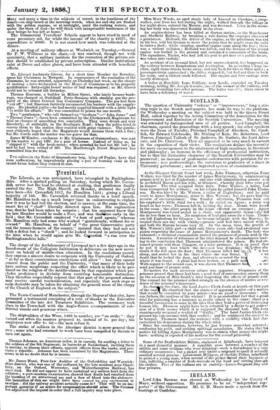SCOTLAND.
The question of University "reform" or "improvement," long a stir- ring topic in the Scotch newspapers, has made its way to the platform. On Wednesday a meeting on the subject was held in the Queen Street Hall, called together by the Acting Committee of the Association for the Improvement and Extension of the Scottish Universities. The meeting was attended by distinguished men of all parties. Lord Campbell, the chairman opened the proceedings with a long speech ; the other speakers were the bean of Faculty, Principal Campbell of Aberdeen, Dr. Cand- lish, Sir Edward Colebrooke, Mr. Stirling of Keir, Dr. Robertson, Lord Neaves, Principal Tulloch of St. Andrews, Dr. Guthrie, the Lord Advo- cate, and Dr. Christison. They all appeared to he very much in earnest in the exposition of their views. The resolutions declare the necessity for more encouragement to the attainment of high excellence in literature and philosophy ; an increase in the efficiency of professorial instruction, but so that the distinctive character of the Scottish lJniversities may be preserved ; an increase of professorial endowments with provision for re- tirements; new professorships ; the extension to graduates of a share in University government ; and an improved system of eseroinations.
At the Glasgow Circuit Court last week, John Thomson, otherwise Peter Walker, was tried for the murder of Agnes Montgomery, by administering prussic acid to her at Eagleshain ; and also with administering prussic acid to Archibald Mason and his wife, at Glasgow, whereby their lives were put in danger. The trial occupied three days. Peter -Walker, a tailor, had been transported for robbery ; on his return he called himself John Thom- son. He was hired by Mr. Watson, a tailor of Eaglesham ; and he paid court to Agnes Montgomery, sister to Mrs. Watson ; but she gave him the reverse of encouragement. One Sunday afternoon, Thomson took out his employer's little child for a walk ; he called on Agnes ; a noise wait heard in her room ; Thomson left it, locking the door. Moans were heard in. the room ; the other people in the house effected an entrance ; Agnes Montgomery was found seated in a chair, and apparently dying—she did die in less then an hour. No suspicion of foul play arose for a time. Thom- son left Eaglesham for Glasgow : he became intimate with the Masons ; he treated them one day with whisky—prussic acid had been mixed with it, and both the Masons became very ill. In the mean time the prattle of Mrs. Watson's little girl—a child only three years old--had awakened sus- picion respecting the cause of Agnes Montgomery's death. The body was exhumed ; a chemical examination proved the presence of prussic acid in the viscera. A number of witnesses at the trial deposed to eircumstances lead- ing to the conclusion that Thomson administered the poison. He had ob- tained prussic acid from Glasgow, on a false pretence. It is au) nosed that he put it into beer which the deceased was drinking; 0o:1;s/ter she drank it she fell upon the floor ; that Thomson lifted her up,as 'd her along, and seated her in the °heir where she was found. r no doubt that he locked the door, and afterwards secreted the ke se, where it -was found. A phial had been broken on a path ase.
With regard to the second case, it was shown that Thomson ha s a se- cond purchase of prussic acid.
No motive for such atrocious crimes was apparent. Shopmates of the prisoner proved that there had been a good deal of oonversation among them on the occasion of Miss Smith's trial respecting the effects of prussic acid. The counsel for the prisoner relied strongly on the absence of motive as evi- dence of the prisoner's innocence.
the case lie observed that the absence of apparent motive—of a motive In char ekg the Jury, the Lord Justice Clerk dwelt at length on this part of
that would e conceived by pure minds—was no proof of innocence : who can fathom the motives of the wicked ? It is an undoubted fact that a great trial for poisoning has a tendency to excite others to the crime : there is A dreadful fascination to some in the idea that they hold a power of destroying human life. Thomson might have bean actuated by a desire to get posses- sion of a little money which it is supposed the deceased had. The Jury unanimously returned a verdict of "Guilty." The Lord Justice Clerk ex- pressed his concurrence with that verdict ; and he sentenced the convict to be hanged. Thomson heard the sentence with a stolidity which bad cha- racterized his demeanour during the whole trial.
' Since his condemnation, however, he Itas become somewhat softened ; confessing his guilt, and seeking spiritussl eonsolation. He states that his motive for killing Agnes Montgomery was, toehtain what money she might have : nothing is reported of his motives for the second poisoning. •
Some of the Staffordshire Militia, stationed at Edinburgh, have behaved in a most shameful manner. A squabble arose between a number of the militia and some civilians who were drinkiug—such a disturbance is a very ordinary occurrence ; but a picket mut under a sergeant to quell it actually assailed several persons : Lieutenant Milligan, of theCity Police, interfered to protect a young man, when several of the picket thrust their bayonets at him, inflicting a -number of flesh-wounds on the head and outting through his clothes. Tive of the ruffians are in custody—Lance-Sergeant Day and four privates.


































 Previous page
Previous page